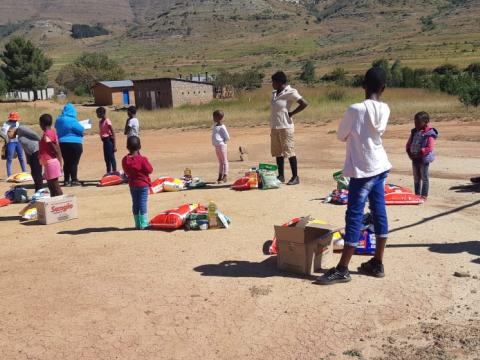Supporting children on ARV treatment during COVID-19 lockdown in Lesotho

For children living with HIV whose families struggle to put food on the table, school days are an opportunity to get their first meal of the day; sometimes their only meal of the day. In the long run, the provision of school meals also motivates them them to continue with their studies despite several difficulties.
With the current countrywide lockdown imposed by the Lesotho Government as a preventive measure against COVID-19, these children's hopes of getting that only meal of the day are dashed. Many of them were at the verge of dropping the medication that has helped keep them alive because it requires that they eat first.
I was about to stop taking the medication because it requires that I eat first. If I take it on an empty stomach, I get sick with stomach cramps.
Limakatso (10) cannot help but look down hiding tears in her eyes as she says this. She lives with an unemployed aunt who struggles to make ends meet. Her mother went to neighbouring South Africa but could not come home for two months due to the lockdown.
These days, Limakatso and her aunt sleep on an empty stomach because even the good Samaritans who used to come to their rescue are no longer coming due to the lockdown.
"The lockdown has made it impossible for us to get the only meal we used to get at school. I am not sure what would have happened if I stopped taking the medication," reveals Limakatso.
Limakatso is among more than 100 children on antiretroviral (ARV) treatment who received food packages distributed by World Vision in Mokotjomela Area programme in the South of Lesotho. About half of these children are on medication that requires that they eat first and current movement restrictions have made it impossible for parents to look for means to support their children. Some children have been left at home to fend for themselves, with parents having gone to neighbouring countries in search of employment but unable to return back home because of the lockdown.
“Now that we have restrictions, I am frustrated when I come to think of the situation that these children live in. They need my daily monitoring but now I cannot and I fear we will lose some of them,” reveals Masophia, a community Development Facilitator at Mokotjomela Area Programme.
As at April 2020, Lesotho has yet to record a single positive COVID-19 case, with 48 suspected cases testing negative. The country however relies heavily on the neighbouring Republic of South Africa for testing suspecting cases. Despite the country‘s population estimated at 2 million, Lesotho has the second highest HIV prevalence in the world. It is estimated that about 340,000 people are living with the pandemic, and 70% are children on ARV treatment (UNAIDS report 2018).The situation is now aggravated by lack of food whilst the country is under lockdown.
In the face of a global outcry for help to reduce the impact of COVID-19 infection, children like Limakatso are increasingly vulnerable, dependent on food availability and continued access to ARV treatment. Their situation may worsen if they are forgotten.
The 2019 Lesotho Vulnerability assessment (LVAC) Report indicates that, due to deterioration in Food security driven by severe drought and an increase in food prices, 30% of Lesotho’s rural population will need humanitarian assistance. With the current lockdown, this number is likely to increase.